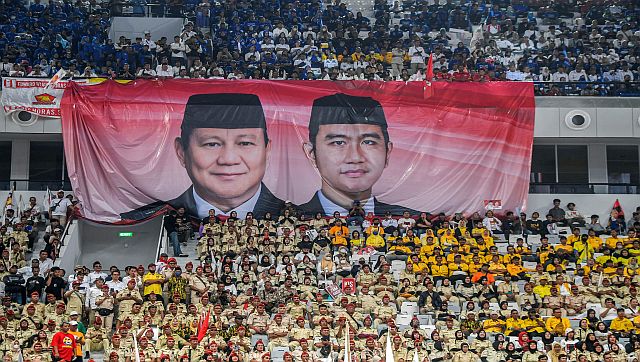The presidential election in Indonesia is less than a year away, and the contest to succeed Jokowi has begun heating up. On Thursday (October 19), Indonesia officially entered election mode, with registration open for candidates interested in running in the next presidential elections in February. More than 204 million Indonesians will cast ballots on 14 February, 2024, as the world’s third-largest democracy elect’s members of its national, regional, and city-level legislatures. More than 20,000 posts are up for grabs in what is the world’s largest single-day election. Here’s what you need to know. What to expect on 14 February? The presidential poll will be held on the same day as a national parliamentary election and voters will also choose executive and legislative representatives at all administrative levels across Indonesia. [caption id=“attachment_13293712” align=“alignnone” width=“640”] Three candidates are fighting to succeed incumbent President Joko Widodo, who is serving the maximum two terms permitted by the constitution. Reuters[/caption] About 205 million of Indonesia’s more than 270 million people are eligible to vote and about a third of those are under the age of 30, according to the election commission. What’s happening this week? Three presidential candidates and their running mates have from 19-25 October to present their credentials and policy platforms to the election commission. A flurry of last-minute manoeuvring is underway by the country’s political heavyweights as they shore up ever-shifting alliances. Who is running? There are three candidates vying to succeed incumbent President
Joko Widodo , better known as Jokowi, who is finishing up the maximum two terms allowed by the constitution.
Prabowo Subianto , who narrowly lost to Jokowi in 2014 and 2019, is hoping third time’s the charm. The defence minister is a controversial figure, with allegations of human rights abuses during his time as special forces commander doing little to dent his popularity among those who admire his heavy-handed leadership style. [caption id=“attachment_13293692” align=“alignnone” width=“640”]
Indonesia’s defence minister and presidential candidate, Prabowo Subianto, along with his running mate, Gibran Rakabuming Raka, who is the eldest son of Indonesian President Joko Widodo and Surakarta’s Mayor, wave after registering themselves for next year’s presidential election, at the election commission headquarters in Jakarta, Indonesia. Reuters[/caption] Ganjar Pranowo is the candidate of the ruling Indonesian Democratic Party of Struggle. His long career in public service, most recently as Central Java governor, has won him a following outside the capital Jakarta. He is neck-and-neck with Prabowo in opinion polls. Anies Baswedan, ex-governor of Jakarta, is an independent candidate, trailing in surveys. Any burning issues? Critics have cast doubt on the integrity of the 2024 election amid what they see as President Jokowi’s attempts to retain influence after leaving office. A top court, headed by Jokowi’s brother-in-law and which will preside over any election disputes, tweaked eligibility criteria that would allow Jokowi’s son to join Prabowo as his running mate — a move that some experts and voters say undermines Indonesia’s 25-year-old democracy. Elections in Indonesia are often a battle of personalities rather than policies, with candidates running on similar platforms promoting growth, jobs, and pluralism in the world’s largest Muslim-majority country. How will a winner be decided? A candidate needs a simple majority of votes to win, or more than 50 per cent. If no one manages that in the first round, a run-off election will be held in June between the two candidates with the highest number of votes. The next president will take office in October, 2024. What happens next? Candidates will ramp up their campaigns, crisscrossing the sprawling archipelago to meet constituents and build support. With inputs from Reuters
Indonesia officially entered election mode this week. Registration for candidates interested in running in the next presidential elections in February has opened. Here’s what to expect in the world’s largest single-day poll
Advertisement
End of Article


)

)
)
)
)
)
)
)
)



